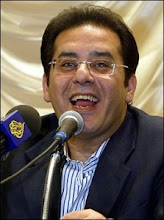Freedom supporters in Egypt are urgently invited to read the following scenario, add their inputs, and get prepared: Mubarak senior or junior goes to the presidential election committee of Heliopolis district in September 2011 to submit his candidacy papers. He will not find the road clean from the supporters of other candidates, particularly the ones who the regime wants to exclude from the competition, upon illegal and undemocratic practices covered by the law.
The hypothetical scene on the morning of submitting candidacy papers, should be as follows: The headquarters of the presidential elections, which is based in a building in heliopolis, across the road from the War College, will mark the unprecedented turnout of supporters for all candidates, regardless of their political affiliations.
The supporters of El-Ghad party, in 2005 “forged” elections, were more than three quarter million of people! Some of them, in 2011, will accompany their candidate while he submits the candidacy papers. They will gather peacefully to express their opinion for the international and local public opinion.
The supporters of some independent candidates (e.g. Dr. Mohamed Elbaradie or Muslim Brotherhood candidate) or candidates of parties threatened by exclusion (e.g. El-Gabha Party) with claim that they started less than five years ago, and others will gather outside the committee headquarters to support the right of their candidates to join the race for presidential seat.
The horrible scene out there will not be the demonstrations or clashes, but the “unexpected” response to article 76 of the Egyptian Constitution, which stipulates that the candidate should be supported by at least 250 members of local municipal councils, Shoura Council, and People’s Assembly; provided that 10 of the supporters must be representing municipal councils in at least 14 governorates.
The presence of people at the election committee will not be artificial for popular pressure. It is also meant to be an execution to article 11 of law 174/2005 of organizing presidential elections; which stipulates that “supporting the candidate is allowed according to the model stated by the presidential elections committee.” In other words, the presence of supporters here is obligatory to know the model they should follow and respond to the committee.
It is also essential that the presidential committee should accept the papers of candidates regardless of the obstacles, according to articles 14, 15, 16, 17, and 18 of presidential elections law. The committee should announce in two daily newspapers the names of all candidates who submitted their papers even before checking their submissions to see if they meet the candidacy conditions or not. This will give an opportunity to supporters of each candidate to wait for few days outside the headquarters of the committee before the final decision is made; i.e. approval or disapproval on candidacy papers.
The whole world should see the odyssey of steadfastness and determination made by the bare hands of people who will enforce their historical right to informed choice.






















